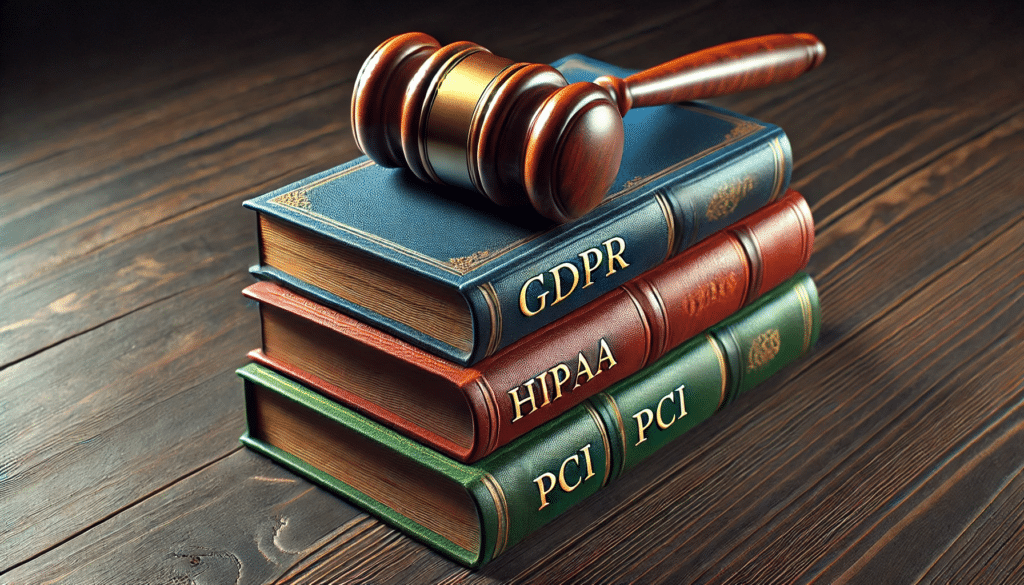
Organizations today are using more data than ever before. Indeed, data plays a critical role in decision-making for everything from sales and marketing to the production and development of new products and services.
There’s no doubt that data can have a transformative impact on your organization. But at the same time, it can be risky to store and use it.
Despite the abundance of available data, you have to be very careful to remain in compliance with an ever-growing list of regulatory frameworks. Consumer privacy laws are becoming increasingly strict as governments and watchdog agencies crack down and hold businesses accountable.
Three important data privacy laws to be aware of heading into 2022 include the Health Insurance Portability and Accountability Act (HIPAA), the General Data Protection Regulation (GDPR), and the Payment Card Industry Data Security Standard (PCI DSS).
These laws are similar in some ways, but they have major differences. Understanding how each regulation works is critical for maximizing data usage while avoiding complications and penalties. Learn about the differences between these frameworks to determine how your organization can ensure compliance.
Before we delve into each critical regulation, let’s discuss how these rules affect business.
Data Regulations 101
Why are data privacy regulations a thing? Why do they matter so much?
What Makes Personal Data So Valuable?
We live in the era of data, and we’ve never generated so much of it before. Due to data analysis and data science techniques, we can now extract much more value from the data we have than would’ve been possible in the past.
Data literate organizations can use the data they already have to build predictive models. They can better understand—and influence—consumer behavior. And they can identify worrisome trends and prevent problems.
Due to all of that, data is an extremely valuable asset—not only for the organizations themselves but for malicious individuals. When personal data gets into the wrong hands, terrible consequences such as financial fraud can ensue.
Data regulations are intended to address this problem.

What Are Data Regulations?
Data privacy regulations are laws, standards, or rules that dictate how organizations that handle consumer data should go about it. Generally speaking, data regulations are good news for us as consumers. They give us rights such as:
- Knowing when and to what purpose companies collect our data.
- Being able to learn exactly what a given organization knows about us.
- Gaining the right to have our data deleted from their databases.
Why Should You Care About Data Regulations?
While data regulations are great for consumers, they pose new challenges to organizations that handle and process user data. Organizations must ensure they obey the regulations that apply to their jurisdiction, under penalty of heavy fines and other consequences.
Data regulations hit technology organizations particularly hard since data is their bread and butter. Thankfully, this work can be easier for an organization that adopts an adequate data compliance tool. More on that later, though. For now, let’s walk you through our list of data regulations. For each one of them, we’ll cover:
- Its definition and history.
- The main takeaways.
- How it can affect your organization.
HIPAA
The first item on our list is HIPAA, a privacy rule that originated in the United States.
Definition and Brief History
HIPAA stands for Health Insurance Portability and Accountability Act. It’s a privacy rule that protects health information and medical records.
The United States Congress established HIPAA. It’s been in effect since 2003.
Main Takeaways
HIPAA’s main purpose is to protect citizens’ health information and medical records. It also ensures patients have rights over their protected information, including:
- Authorizing or not authorizing the use of their health data.
- Getting copies of their data.
- Knowing their health data can only be disclosed to authorized parties and for health purposes—for example, getting the right treatment.
What does HIPAA protect? Everything that’s considered protected health information (PHI). This means health-related information that someone might use to identify a patient. For instance:
- Full name
- Telephone number
- Email address
- Physical address
- Date of birth
- Facial picture
Who Does It Affect?
Who must comply with HIPAA? The so-called covered entities that collect and process PHI. Those include:
- Health plans
- Doctors
- Dentists
- Clinics
- Company health plans
GDPR
Our second item is GDPR, certainly the best-known of data privacy regulations.
Definition and Brief History
GDPR stands for General Data Protection Regulation. It’s a European Union law that regulates the collection and processing of user data.
The law was adopted in 2016 but took effect two years later. Since then, the GDPR has been an inspiration for similar regulations worldwide.
Main Takeaways
Unlike HIPAA, GDPR isn’t restricted to health-related sensitive data. Instead, the GDPR is much broader, covering any kind of sensitive data.
Here are some of the rights the GDPR gives users.
- Companies need explicit consent from users before collecting and processing their data.
- Users can withdraw the consent later.
- Users have the right to request access to their data.
GDPR considers personal data as everything associated with an identified or identifiable individual.

Who Does It Affect?
GDPR affects a much broader set of organizations than HIPAA does. If an organization does business in the European Union or simply stores data from EU residents, it must comply with the GDPR.
PCI DSS
Last but not least, we have PCI DSS, a regulation for online payments.
Definition and Brief History
PCI DSS means Payment Card Industry Data Security Standard.
Unlike the two previous items, PCI DSS (henceforth PCI, for short) isn’t a law. Instead, it’s an information security standard. The Payment Card Industry Security Standards Council established it, and it’s been in place since 2004.
Main Takeaways
The main purpose of the PCI is to ensure credit card payments are processed safely, so customers are protected, and card fraud is reduced. PCI imposes security measures on data collection and the storing and transmission of credit card data.
Who Does It Affect?
All companies that store and process card information should comply with PCI. Interestingly, since PCI’s not a law, there’s no official legal entity to enforce compliance.
In practice, though, enforcement falls to the major credit card providers, such as Visa, Mastercard, and more.
HIPAA vs GDPR vs PCI: How Do They Compare?
We’ve just covered three important regulations or standards related to data protection. How do they compare?
PCI is certainly the odd one out of the three since it’s not a law but an industry standard. If you have a web app or service, chances are you accept payments by credit card. In such cases, you must comply with the standard. Using a third-party payment processing solution makes sense in most cases. It won’t eliminate the compliance requirements with PCI, but it might reduce them.
HIPAA is the most specific of the three items we’ve seen today. It will apply to you only if you’re a covered entity handling data from patients from the United States.
GDPR is certainly the broadest of all three. Since it protects a wider set of data and a larger population (residents of the EU), you’re likely to have to comply with it.
So, what should your next step be?
For starters, continue learning about these and other regulations. Consider specialized training if you judge that’s necessary. At some point, though, it’ll probably be worth it to consider a specialized tool to help you handle data compliance; you can also access the in browser demo today.
